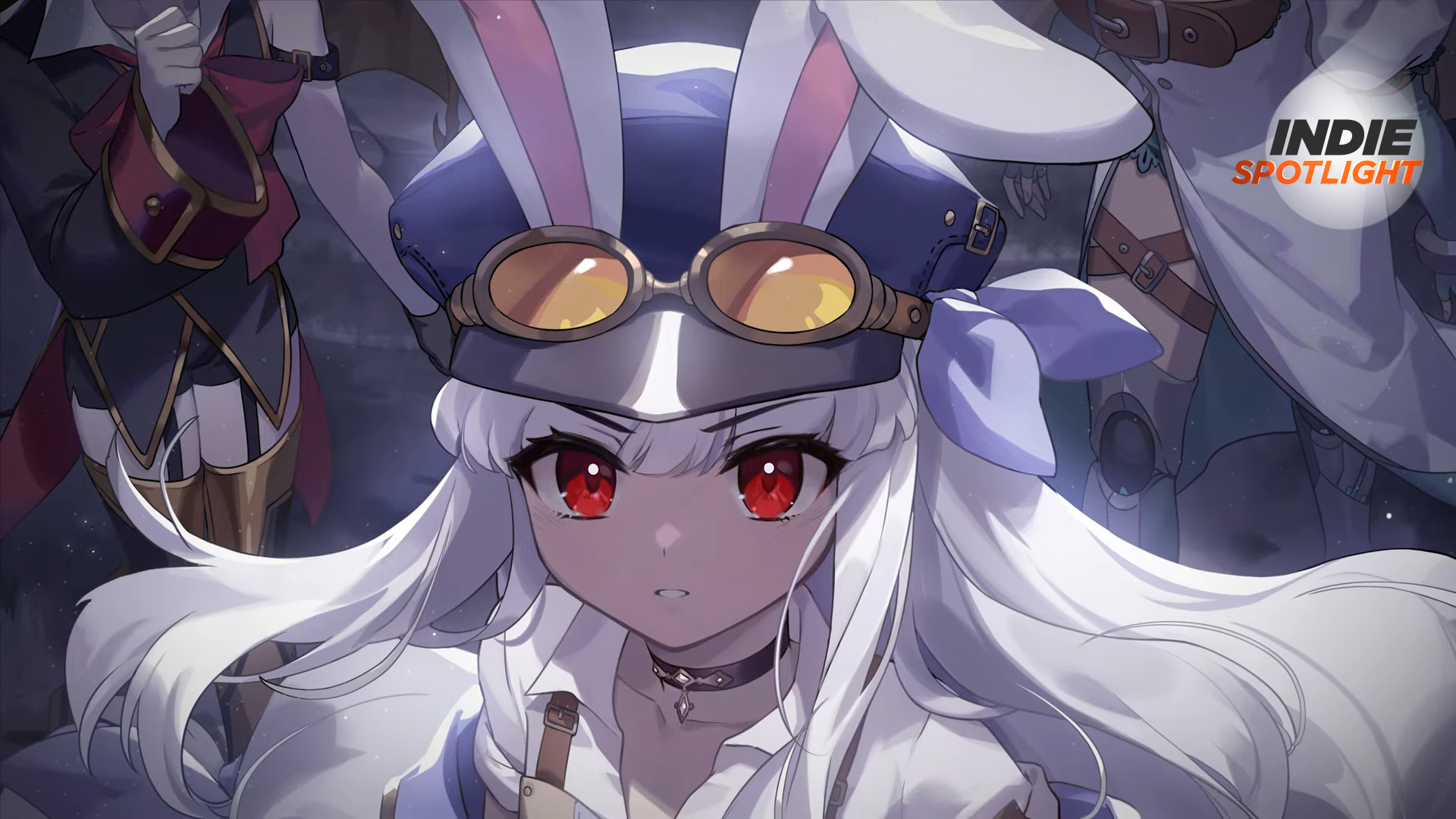
I always spend my Christmas holiday catching up on a big game that I didn't have time for earlier in the year. Against all odds, I've already beaten Baldur's Gate 3, so that's done and dusted. But the question is no longer what I'm going to play but what else, because I am absolutely playing TEVI, a new bullet hell Metroidvania from the makers of 2016 cult hit Rabi-Ribi. I tried the demo earlier this year and left it encouraged, and having dipped my toes into the full game – but not yet beaten it – you can officially put me down as impressed. TEVI already feels like one of the best Metroidvania games of 2023, and it's definitely one of the biggest upgrades I've ever seen from a sequel, spiritual or otherwise.
Rabi-Ribi is a cute and straightforward 2D Metroidvania about a bunny girl and her fairy friend lasering and hammering their way through screens of projectiles. It's a little basic, but it holds up well to this day and offers a lot of post-game depth. TEVI feels like a more ambitious and involved reading of Rabi-Ribi's playbook, right down to the bunny girl protagonist (whose ears are fake this time). It looks, sounds, and feels better in almost every way, though I can see how diehard fans of Rabi-Ribi may be put off by some of the changes. But as someone who liked but didn't quite love the first game, I'm happily embracing the new. It's not Rabi-Ribi 2, but rather Rabi-Ribi: More My Speed.
Once more, with feeling
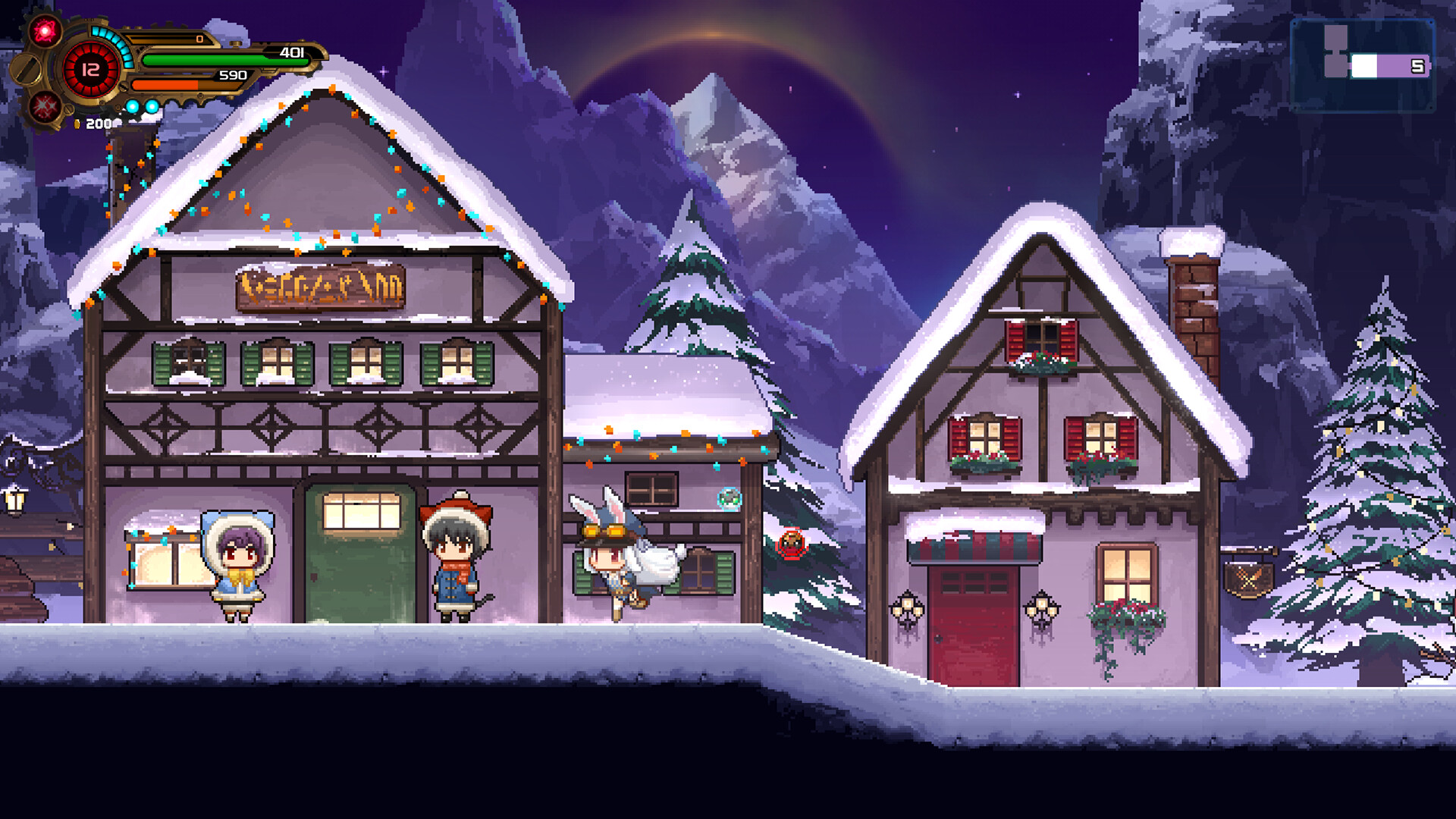
Combat is the biggest winner in my book, with the dramatically improved pixel art and color palette coming in as a close second. Rabi-Ribi protagonist Erina always felt a little clunky to me, while Tevi – that's our heroine's name, too – is lightning fast. Within hours, I'm pretty sure I've unlocked more attacks than I got in the entire previous game, and chaining them together is much more fluid. Outside of bosses, I was always pretty neutral about the prospect of fighting more enemies in Rabi-Ribi. Here, I'm constantly hungry to stunlock, air juggle, and otherwise combo the daylights out of anything that moves because it's just plain satisfying.
As long as there are dudes to hit, and they aren't in their color-coded indomitable stance, Tevi can essentially attack forever, whether she's hovering mid-air or absolutely Goomba-stomping dudes beneath her. You've got light attacks, special heavies, uppercuts, backflips, spin attacks, knife throws, a huge range of gadgets, and a proper dodge that sits alongside the bullet hell-standard emergency button that you smack when the bullets get a little too hellish.
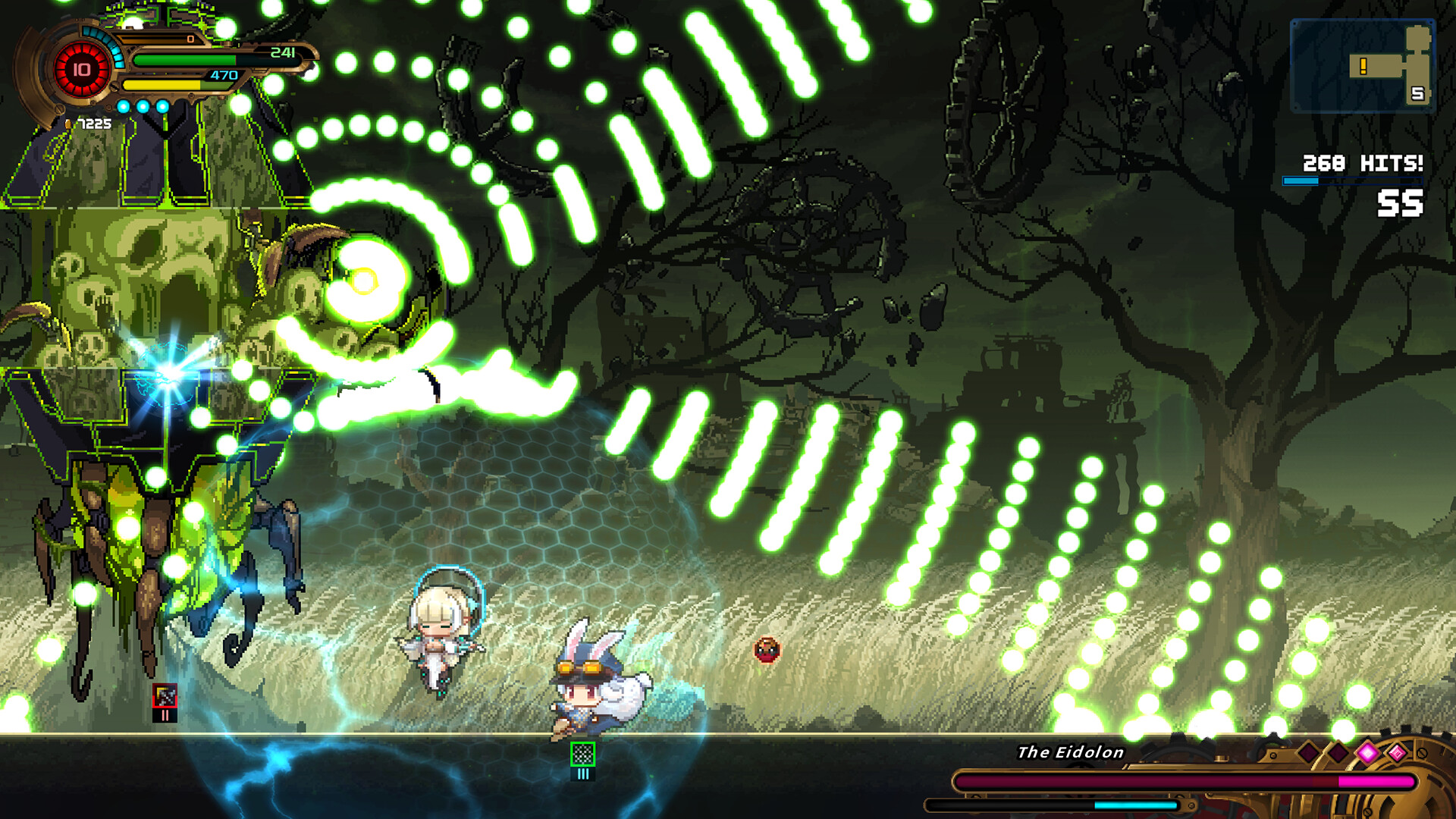
On top of that, virtually every move in your arsenal can be adjusted via literally hundreds of collectible sigils arranged into a play style-defining loadout. This, too, is considerably more advanced than Rabi-Ribi's badge system – like, by a factor of 10. This kind of thing is tailor-made for min-max goblins like me, and I look forward to spending hours in my inventory making the most busted build possible.
If there's a downside to the added power and mobility that Tevi wields, as well as the complexity of the combat system's surrounding systems, it's that all of this incredibly fun stuff seems to have flattened the difficulty curve a bit. The ceiling for skill expression is sky-high, but the enemies you're using to express that skill aren't quite as ruthless. I remember Rabi-Ribi being so hard on, well, hard mode that I lowered the difficulty to normal. Tevi, meanwhile, has me considering the highest difficulty setting possible. I'm not really bothered by this, personally; higher difficulty settings do deliver a meaty challenge, and instead of raw challenge, I'd much rather be motivated to test myself within gameplay I find more engrossing. If I wanted a near-impossible bullet hell experience, I'd play a pure-blooded bullet hell.
Metroidvania-lite
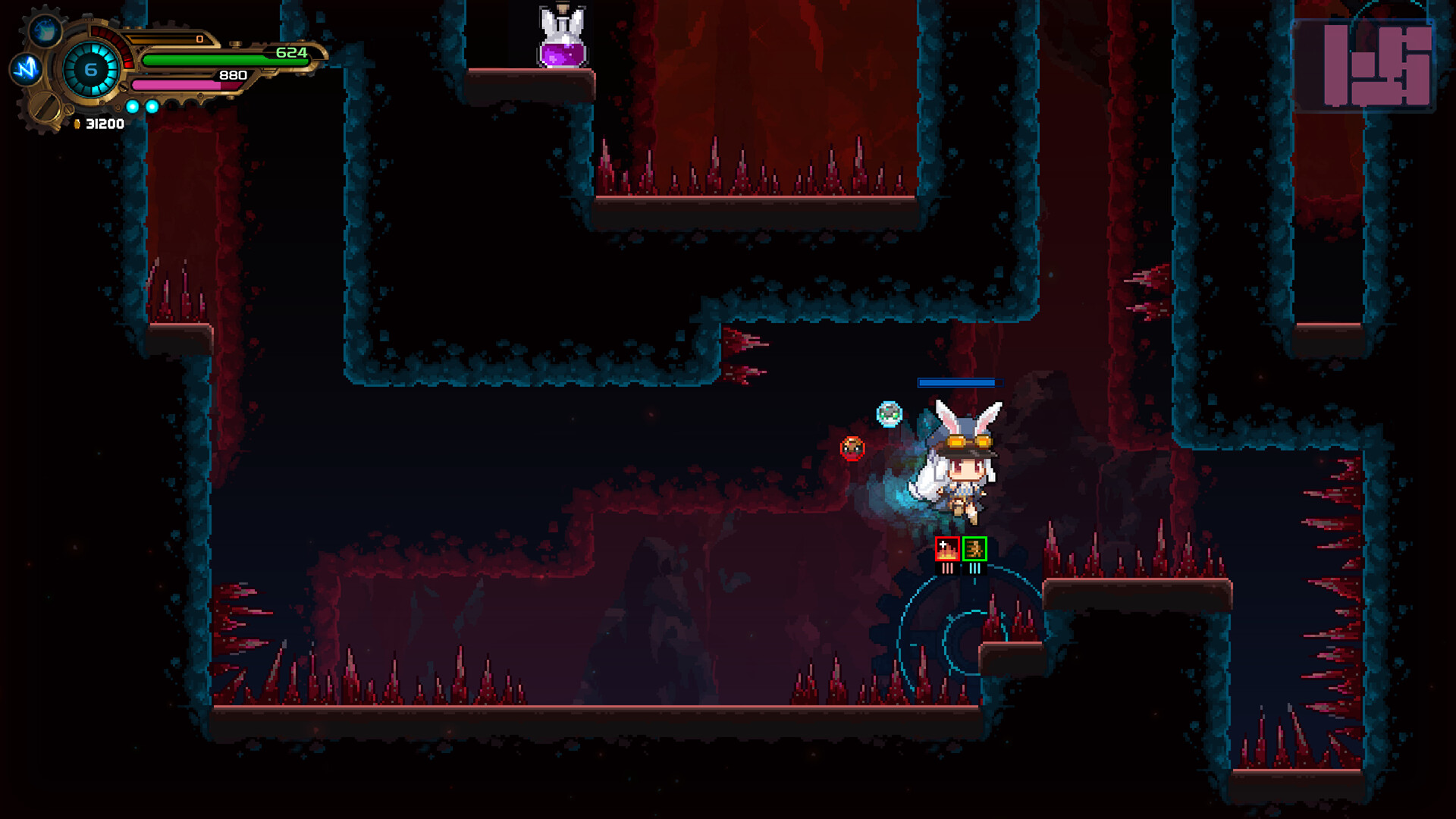
Similar growing pains are found in Tevi's more front-facing story, and this is one point where I'm a little more aligned with the Rabi-Ribi diehards. As a gameplay-first player, I'm not concerned with the actual structure and cohesiveness of the narrative. It seems like over-scoped fantasy nonsense carried by likable and well-voiced characters, which is fine by me. I didn't come into the bunny girl bullet hell expecting, or looking for, a literary masterclass. And frankly, I couldn't really tell you what happened in Rabi-Ribi, either.
What I do care about is the way Tevi's story can sometimes limit exploration, and in a way that happened far less frequently in Rabi-Ribi. More often than I'd like, I'll head toward what looks like a new area or secret path only to be turned away by someone in my party shepherding me back toward the next story beat. TEVI is demonstrably more ambitious, yes, but also more strictly designed. Non-linearity is consequently reduced, so there's seemingly not as much room for sequence-breaking and the like.
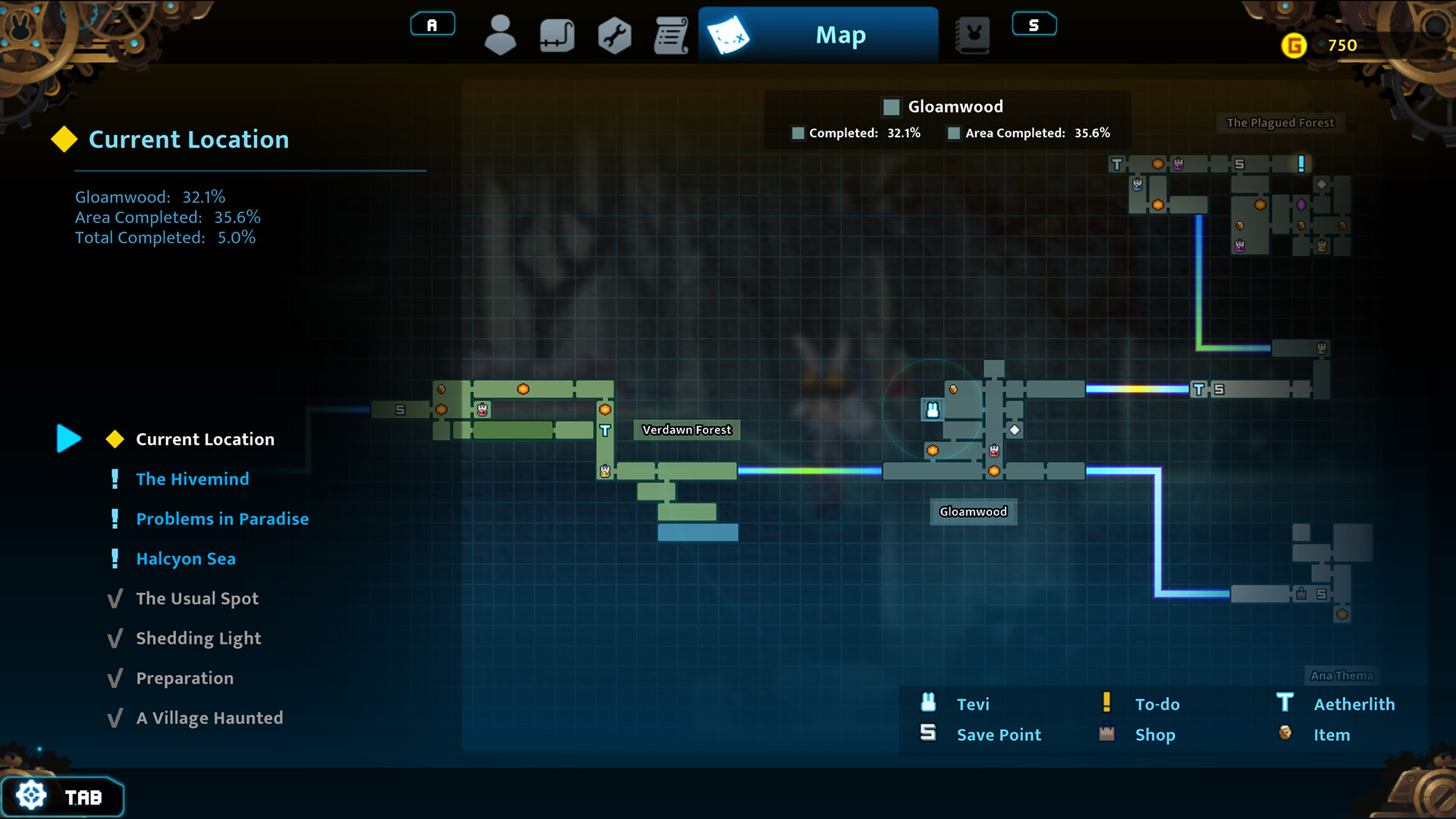
The search-action bones of the Metroidvania genre are here and they work well when utilized, but discovering new areas isn't the backbone of the experience. There's still a load of items and upgrades to find in TEVI that are well worth exploring and back-tracking for, and the game works very well as a Metroidvania on that micro level. It feels like every other segment of most levels hides some kind of secret. But in terms of big-picture exploration across the whole world map, I haven't been deviating as much from the path laid out by the story compared to Rabi-Ribi. Here, too, this isn't a big problem for me simply because I am so enamored with combat, plus I love scrounging up stat upgrades like a litRPG Katamari, but the explorer in me would appreciate a little more elbow room. Who knows, maybe it'll open up in the hours to come.
These are ultimately small complaints about a game that is a constant joy to watch and play. Thus far, I find myself agreeing with TEVI's 90% score on Steam (the game is also on Switch, by the way). I wouldn't call it perfect, as I wouldn't most games, but I am finding it increasingly hard to put down the more I play. It's meaningfully different, visually stunning, and overall much more to my taste. As a follow-up to Rabi-Ribi, it was worth the wait.







